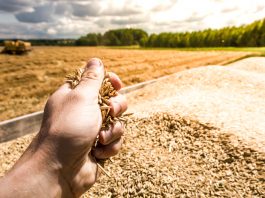In a new study, researchers from the Carnegie Institution for Science have analysed a variety of technologies for reducing the amount of greenhouse gas emissions that are released by the agriculture industry.
Achieving net-zero agriculture will require technological innovation and investment, according to new work from Carnegie Staff Associate Lorenzo Rosa and Visiting Scholar Paolo Gabrielli.
“Right now, farming is responsible for about 12% of all global greenhouse emissions,” Rosa explained.
Right now, farming is responsible for about 12% of all global greenhouse emissions
“Agriculture is not only a significant contributor to climate change; it is also one of the first victims of its consequences, including warming, drought, and altered precipitation patterns.”
The work, ‘Achieving net-zero emissions in agriculture: a review,’ is published in Environmental Research Letters.
Why is achieving net-zero agriculture a challenge?
The team set out to analyse a variety of technologies for reducing the amount of greenhouse gas emissions that are released by agriculture. By doing this, they were able to learn how far these tools could take us on the road to net-zero emissions.
Achieving net-zero agriculture is challenging as agricultural greenhouse gas emissions come from methane and nitrous oxide, and both of these gases have a much greater warming potential on short-time scales than carbon dioxide.
Agricultural decarbonisation strategies rely on using carbon-free energy sources
Rosa and Gabrielli looked at many strategies, including alternative energy sources on the farm, more sustainable fertiliser, fertiliser management, and feeding and breeding strategies for reducing livestock methane emissions.
These strategies rely on using carbon-free energy sources. This means that implementing them would require integrating renewable energy systems into farm operations. Sustainable methods for producing fertilisers and pesticides should also be developed.
Implementing sustainable irrigation practices is not only crucial for improving water sustainability but also for reducing energy consumption and methane emissions associated with rice cultivation.
Technology could help farmers lower agricultural greenhouse gas emissions by 45%
The team discovered that technology could help farmers lower greenhouse gas emissions by up to 45%.
However, achieving net-zero agriculture will require carbon dioxide removal strategies that are expensive and currently not widely deployed.

Particularly promising approaches involve a combination of sustainably produced bioenergy usage and techniques that capture emissions from these energy sources.
Another possibility was speeding up the natural rock erosion process, which removes carbon dioxide from the atmosphere.
These technologies could achieve net-zero agriculture – shifting the industry to a sector that withdraws carbon dioxide from the atmosphere.
The study also explores new technologies that extend beyond the boundaries of traditional agriculture. These include methane removal and farm-free production of some foods.
However, more research is needed to make these tactics affordable and scalable, as well as to understand their wider impacts.
“Innovations in irrigation and fertiliser have improved global crop yields, but this increased production ignores the climate impacts of the strategies upon which it depends,” Gabrielli said.
“As warming increases, it will become increasingly difficult to produce enough food for a growing population and novel approaches that take climate mitigation into account will be necessary.”
The future of net-zero agriculture
Sustainable agricultural practices could improve energy security, water scarcity, and biodiversity loss.
However, for these technologies to be implemented, an interdisciplinary effort that involves plant science, hydrology, engineering, economics, and political science is required.





